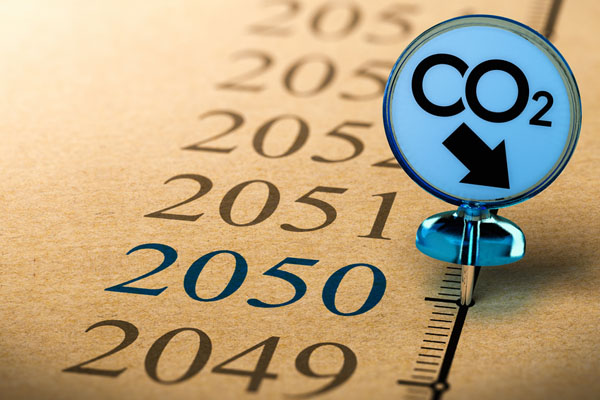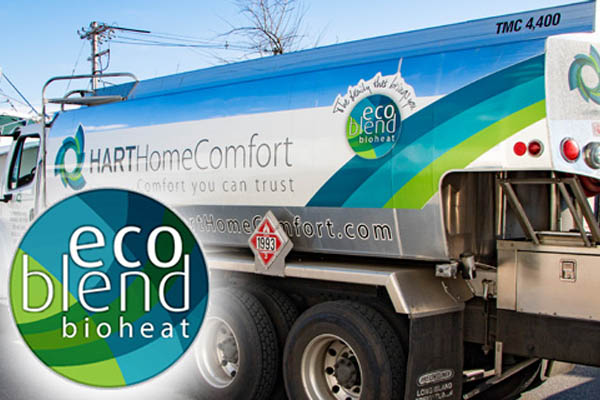How Can The Oil Industry Achieve Carbon Neutrality By 2050?

We’ve recently experienced a shift in our environmental focus in the US and around the globe. More than ever, the world is zeroing in on ways to achieve carbon neutrality.
Big business and worldwide governments are looking to expand the wind, solar, water, and geothermal industries to lower our carbon footprint. But they’re missing an opportunity on the easiest and most cost-effective way to make this happen.
The oil industry already has the answer. As far as home heating is concerned, we can achieve carbon neutrality by 2050 through the use of our EcoBlend Bioheat® heating oil.
We’ll look closely at EcoBlend Bioheat® fuel oil and its ability to transform the home heating industry in Nassau County, Suffolk County, and Queens, New York by examining the following topics in greater detail below:
- The Ultimate Goal of Carbon Neutrality
- Achieving Net Zero Carbon Emissions by 2050 with Bioheat® fuel
- The Stages of Developing a Carbon-Free Future
Stick around to learn more about these significant topics.
The Providence Resolution Sets Its Sights On Carbon Neutrality By 2050
Table of Contents
- 1 The Providence Resolution Sets Its Sights On Carbon Neutrality By 2050
- 2 Achieving Net Zero Carbon Emissions by 2050 with EcoBlend Bioheat® Heating Oil
- 3 The Stages of Developing a Carbon-Free Future with EcoBlend Bioheat® Heating Oil
- 4 Call Hart Home Comfort To Schedule An EcoBlend Bioheat® Heating Oil Delivery
An amazing thing happened in 2019. The Northeast’s heating oil industry got together and made a solemn vow that they affectionately call the Providence Resolution.
During the Northeast Industry Summit, held during the HEAT Show at the Rhode Island Convention Center in Providence, the entire industry stood together, and in one voice as they vowed to achieve net-zero CO2 emissions by 2050.
And the best part?
Not only will they achieve this ambitious goal with time to spare, but the schedule is also already set. They will reduce carbon emissions according to a specific schedule at certain intervals along the way.
- The schedule is as follows:
- 15% carbon reduction by 2023
- 40% carbon reduction by 2030
- Net-zero carbon emissions by 2050
Was this plan made in earnest? Or is net-zero carbon emissions too far from grasp in the next 30 years?
It might seem like it on the surface, but industry experts have worked diligently to solve this problem for some time with Bioheat® heating oil. And they’ve made impressive inroads thus far.
The oil industry wouldn’t have made such an aggressive proposal if they didn’t believe it was achievable. Learn about their plan and so much more below.
The Ultimate Goal of Carbon Neutrality
In a nutshell, the goal of achieving carbon neutrality means balancing the number of carbons being emitted and the carbon sinks absorbing them from the atmosphere.
How is this achieved?
Mainly, the way we achieve carbon neutrality is by removing carbon dioxide from the atmosphere. It then has to be stored via a process known as carbon sequestration. To reach this level, and achieve net-zero emissions, we must focus on using carbon sequestration to counterbalance greenhouse gas emissions.
Or we have a better solution known as carbon offsetting.
This method helps us reduce carbon emissions and achieve carbon neutrality faster by offsetting or reducing the amount of carbon produced in home heating.
How is this possible? It’s possible through heating homes using renewable energy sources. But in particular heating homes using a combination of biodiesel and ULSHO.
We will emit less carbon into the atmosphere by switching to this heating source. Using our liquid renewable heating oil known as Bioheat® heating oil is the best way for our customers to accomplish our overall goal of net-zero emissions.
And the best part?
We’re already working hard to lower carbon emissions in Long Island. Hart Home Comfort already delivers a liquid renewable fuel named EcoBlend Bioheat® heating oil.
Achieving Net Zero Carbon Emissions by 2050 with EcoBlend Bioheat® Heating Oil
You might be thinking, “This sounds great on the surface. But how will EcoBlend Bioheat® heating oil specifically help to achieve net-zero carbon emissions by 2050?”
This is a great question. And it deserves a great answer.

Thankfully, EcoBlend Bioheat® heating oil is so versatile that it helps lower carbon emissions – and will eventually eliminate them altogether – in a number of spectacular ways.
They include:
It Lowers Carbon Emissions
Too many people fail to recognize the importance of liquid renewable heating fuel. This crucial liquid heating fuel is the only source of its kind that can actually lower carbon emissions. By blending together biodiesel and ULSHO, the oil industry has developed a heating fuel that incorporates renewable energy sources to cut down – and eventually cut out – carbon emissions. At the moment, oil industry experts have a heating oil blend that contains 20% biodiesel. It is referred to as B20, and when compared to petroleum diesel, it significantly lowers carbon emissions.
It’s Made with a Renewable Energy Source Called Biodiesel
The key green energy ingredient in EcoBlend Bioheat® heating oil is biodiesel. It’s a renewable energy source because it uses agricultural byproducts like corn oil, used cooking oil, soybean oil, canola, tallow, and fats and converts them into a fuel source to heat your home, according to the National Biodiesel Board.
Right now, the oil industry is working diligently to create even more powerful blends. By the time the year 2050 rolls around, the goal is to have your existing heating system capable of handling B100, a liquid fuel source made entirely from renewable agricultural byproducts.
Why wait? Begin lowering your carbon footprint now. Each of our customers already consumes environmentally friendly biofuel at no additional cost.
It Doesn’t Require A Heating System Equipment Upgrade
Finally, financial concerns play another critical role in achieving net-zero carbon emissions by 2050. Currently, the US government is working hard to lower carbon emissions, but they aren’t being fiscally responsible with your money.
Today, there is a significant movement called “electrification.” The idea is to have all heating systems switch to electric heat pump heating technology. This is an incredibly expensive proposition for the average homeowner.
Not only may you need an entirely new electrical heating system for your home. You’ll also have to pay someone to remove your existing oil heating system and install a new electric heat pump system at a huge cost. Switching from oil heat to electrical heat could cost the average homeowner $25,000 or more. Can you afford to pay these out-of-pocket expenses?
The obvious solution is to use your existing heating system and still achieve net-zero carbon emissions by 2050. The perfect answer to this problem is our liquid renewable heating fuel, which doesn’t require buying costly specialty equipment while paying massive unnecessary expenses.
The Stages of Developing a Carbon-Free Future with EcoBlend Bioheat® Heating Oil
At the moment, the oil heating industry has a four-stage plan in place to completely eliminate carbon emissions by 2050. And their brilliant scientific minds and technicians are working meticulously to achieve this monumental task. And I’m happy to say that we’re on target to achieve this goal.
The four stages are as follows:
- Current Stage – the biodiesel industry is currently serving customers using a biodiesel fuel known as B10. This product contains 10% biodiesel. This blend reduces Mercury emissions, CO2, particulate matter, and SOx emissions effectively, according to NESCAUM.
- By 2023 – in this stage, the industry will predominantly serve customers with B20 biodiesel fuel. It contains 20% biodiesel and this blend reduces CO2 emissions by 14.6%. It also performs better at reducing GHG emissions than natural gas.
We are already delivering B20 to our customers and have been for quite some time! - By 2030 – in the next 8 years, industry experts continue to develop an effective 50% biodiesel fuel categorized as B50. This potent blend will eliminate 4.29 million metric tons of carbon and eradicate the need for heating oil to the tune of 500 million gallons.
We are on track to begin delivering B50 ahead of the industry’s 2030 goal. - By 2050 – this goal is in sight. The industry will have developed a 100% biodiesel fuel source that works in existing oil heating systems. This liquid fuel will reduce carbon emissions by 8.9 million metric tons and abolish the need for 1 billion gallons of heating oil.
Conclusion
As you can clearly see, government agencies and big businesses are missing the boat on a tremendous opportunity. They’ve overlooked the environmental and economic value of providing a renewable biofuel to effectively reduce and eliminate greenhouse gas emissions.
Are you ready to do your part to lower carbon emissions?
Residents in Nassau County, Suffolk County, and Queens, New York can contact Hart Home Comfort right away to switch to EcoBlend Bioheat® heating oil . We’ll immediately begin fueling your home with cleaner and more efficient biofuel instead of regular heating oil. And you’ll begin doing your part to lower carbon emissions and preserve this beautiful planet for many generations to come.
Call Hart Home Comfort To Schedule An EcoBlend Bioheat® Heating Oil Delivery

Hart Home Comfort adopted the Providence Resolution and set standards to ensure that we meet these goals in the industry. We take climate change very seriously, and we have set our expectations above and beyond what the Providence Resolution has set.
You can automatically help the environment by using EcoBlend Bioheat® Heating Oil. Be our customer and schedule your delivery with Hart Home Comfort today.
For any questions about what Hart Home Comfort can do for you, give us a call today. Click here to contact us now or call us at (631) 667-3200 to find out more!